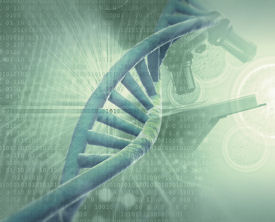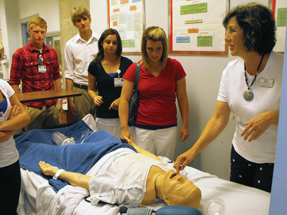Genetic tests are being used more, and they're worth it
Molecular diagnostics tests could cost Americans $15 billion to $25 billion by the end of the next decade. Physicians believe the tests are warranted, although they're skeptical about costs and their ability to interpret them properly for patients.
Getting a handle on the extent to which molecular diagnostic (genetic) testing has penetrated the U.S. health care market is a considerable challenge. Byzantine coding and billing procedures, as well as fragmentation of the health care system, have contributed to a relative dearth of solid data. This makes policy planning a challenge and raises questions about whether practicing clinicians should prioritize learning about these types of tests.
A report from UnitedHealth Center for Health Reform and Modernization published in March 2012 provides useful insights; the data are pretty remarkable. As of 2010, molecular diagnostic testing (including genetic tests) accounted for an estimated 8% of U.S. spending on clinical laboratory services. There has been a 14% increase from 2008-2010, a rate that is substantially higher than the growth of overall health expenditures. These numbers translate to an estimated total U.S. expenditure of $5 billion in 2010, with projected growth to between $15 and $25 billion by 2021. These numbers should make patients, clinicians and insurers sit up and take notice.

The report also reveals a variety of interesting facts regarding the nature of the spending. A priori, many would have expected that the largest single category of expenditures would have been in the area of oncology. Not true. In fact, infectious disease holds that distinction, likely because of the high volume of these relatively low-cost tests.
In addition, in most cases, increasing costs per test didn't generally drive increased expenditures. Rather, there has been a substantial uptick in test utilization. This is not the case, however, for cancer-related testing, where the growth of costs per test is the driver of cost, an estimated 9% per year.
Perhaps the report's most surprising finding is that the estimated per capita expenditures were 16% and 24% higher, respectively, for Medicare and Medicaid managed care plan participants than for patients in commercially insured plans in 2010. If this discrepancy is not simply due to a quirk in UnitedHealth's data, two observations come to mind.
First, populations that might be thought to be underserved in terms of genetic services may not be as underserved as many (myself included) think. Clearly, this assertion needs to be taken with a grain of salt. It would be interesting to get a look under the hood to understand the data better. Second, the 40 or so states struggling with their budgets, often due to Medicaid costs, need to keep an eye on this area of expenditure.
If UnitedHealth's projections bear out over the next decade, molecular diagnostics will no longer be an inconsequential part of the budget outlay. State and federal agencies should take a measured and informed look at the value that molecular diagnostics bring to Medicare and Medicaid beneficiaries, rather than reflexively denying access.
UnitedHealth's report also includes some interesting survey data from a 2012 Harris Interactive poll that queried 1,506 U.S. consumers and 1,254 physicians regarding genetic testing.
On the consumer side, about 70% stated they were familiar with genetic testing, with 6% and 10%, respectively, reporting that they or a family member had actually had a genetic test. Over 70% felt that genetic testing allows more personalized care and that genetic testing will increase in next five years.
Physicians reported a low rate of recommending molecular diagnostic testing in their practices (about 4% of patients). However, about 74% of physicians reported that they felt some patients in their practice would benefit from testing. Overall, physicians expressed a relatively low level of confidence in their ability to interpret molecular diagnostic test results, although about half felt they could interpret pharmacogenomics and infectious disease test results. Physicians also clearly articulated concerns regarding the cost of molecular diagnostic tests, both from the perspectives of individual patient access and overall health care costs.
The report concluded with a discussion of six domains that bear attention as molecular diagnostic tests are rolled out:
- 1. Protecting, supporting, and informing patients through data confidentiality, non-discrimination, and decision support;
- 2. Benefiting patients by developing the clinical evidence base to determine which tests work;
- 3. Stimulating future progress by encouraging the development of tests that are proven to work;
- 4. Monitoring care through more transparent coding and reporting;
- 5. Protecting patients by ensuring that lab tests are performed safely and accurately; and
- 6. Making it easier for health professionals to stay up-to-date as genetic science evolves.
Frankly, the domains are spot on, although within the domains there is room for substantial debate over details. The National Human Genome Research Institute is largely dedicated to a research mission in the genomic sciences; however, it has long been engaged in activities that relate to each of these applied domains. I hope reports like UnitedHealth's will stimulate the engagement of others, including the practicing clinician, in the issues related to molecular diagnostic testing in health care.



